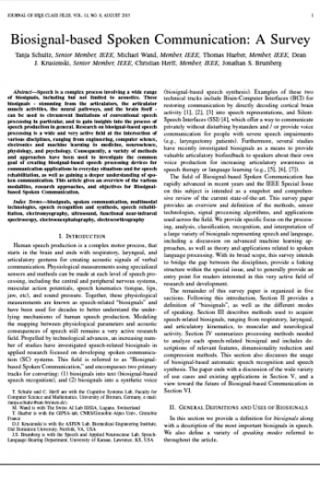Biosignal-Based Spoken Communication

Biosignal-Based Spoken Communication
Special Issue edited by Tanja Schultz ; Thomas Hueber ; Dean J. Krusienski ; Jonathan S. Brumberg
Editeur : IEEE/ACM Transactions on Audio, Speech, and Language Processing, volume 25, n° 12, December 2017
Fiche éditeur
SPEECH production is a complex process resulting from human activities initiated in the brain, eventually leading to muscle activities that produce respiratory, laryngeal, and articulatory gestures which finally create acoustic signals. Traditional speech processing systems capture and interpret the acoustic signal of speech. However, speech is not only limited to acoustics – speech-related activities can be measured at each level of speech processing, including the central and peripheral nervous systems, muscular action potentials, and speech kinematics. Their measurement, obtained through recordings from variety of sensor technologies, results in speech-related “biosignals” that have been studied for decades to better understand the underlying mechanisms of human speech processing.
The special issue features 12 articles that span the topics discussed in the survey, including studies that focus on gaining knowledge about speech production, e.g. the effect of particular speaking modes on articulatory kinematics, the classification of voice qualities based on different biosignals, and the exploration of alternative biosignals for discriminating between speaking modes. These papers are followed by work on the processing of biosignals based on speech recognition and speech synthesis techniques for silent speech interfaces, while the last two articles focus on use cases, namely on restoring spoken communication language learning.
